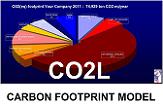Should we become 'environmental capitalists'?
Should we become 'environmental capitalists'?
- Regulation is costly and gives the wrong signals to the public
Currently the public gets the wrong signals concerning environmental protection. Whereas most people agree that something needs to be done on environment, many people do not really understand why they have to pay so much for keeping it clean. In the Netherlands an average family already pays more than 1000 guilders each year for sewerage, sewage treatment and waste management. At the same time they are asked to collect separately organic waste and bring paper and glass to collection points. The tendency in the last ten years also has been that costs of environmental services have been increased by more than 100%. A critical citizen would ask him- or herself why these costs have been increased and what can be expected for the future? Since, at the same time we are still far away from a sustainable society, thus additional cost increases for citizens might be the case. To my opinion this gives at least a negative signal to citizens: you have to pay for environment, and these payments will increase in the future!
- Give emission rights/environmental shares to citizens
I would propose to make us all “environmental capitalists” by giving emission rights (“environmental shares”) to citizens. This is a democratic solution, isn’t the environment of us all? No longer the administration will give permits to pollute, companies and other polluters then would have to buy the environmental shares (=pollution rights) from citizens. For the citizens this creates additional income, which can be as much as several thousands of EUROS per year per citizen as a rough calculation of TME has shown. The emission rights should be regarded as environmental shares and can (must) be traded (although the idea of speculating with these shares is attractive from a “green” point of view). Such a system could operate in a simple way. Each year the administration calculates the amount of environmental shares each inhabitant receives, based on the national ceiling for CO2, SO2, etc. Trade of shares could take place at the stock markets, it would also be imaginable that administration buys part of the rights and brings them on the market. In principle the system should operate internationally, making trade of emissions between for example east and west possible.
- Institutional barriers
Of course there are some institutional barriers to take before such a system can be implemented. For industry it will lead to additional costs, as they have to pay for pollution whereas in the current situation they may pollute for free up to the permitted levels (although this is less and less the case: in the Netherlands companies also pay for permitted water pollution, in many central and Eastern European countries taxes on air pollution exist, most EU countries apply a sort of carbon tax, landfill taxes also become more and more popular). For regulators there will be less work: no more standards/permits are needed for each installation/sector/type of process. It is imaginable that the lawyers and technicians in administration will not be happy with the idea to get unemployed. On the other hand monitoring becomes more important (because pollution actually means money), so more effort needs to be made for a good monitoring system. A third drawback is that such a system inevitably means international co-operation, thus implementation will take a long time (note the ongoing discussions on an European Union wide carbon tax). With implementation of such a system in the Netherlands only, at least some of the advantages would not be present in such a case.
- Big advantages
But the advantages of a system of “environmental shares” are numerous!! First it creates additional income for citizens, it could be seen as an alternative to a “base-income”. Since citizens receive money for environment, the attitude towards environmental protection may be assumed to be positive: the more environmental attention, the higher the prices (less shares are on the market). Additionally, by using ceilings and putting just enough shares on the market each year the environmental goals are achieved without “any” additional regulation, civil servants do not have to worry anymore about how and where the additional emission reduction should be achieved. By giving the shares to citizens in stead of companies, the largest problem attached to a system of tradable permits – the initial division of rights amongst polluters – is coped with: for newcomers on the market the same rules apply as already settled industries. Settled industries cannot use their rights in a monopolistic way (as they could in a system of grandfathering (=giving away for free to established polluters) emission rights to industry). Using environmental shares as the main instrument in environmental policy also would mean that from a macro economic perspective the most cost-efficient solution to achieve (international) environmental objectives is reached (in theory). For the citizens of Central and Eastern European countries the system could mean a relief for the current economic burden: selling rights would increase the income of the poor considerably. So the instrument of “environmental shares for citizens” passes the test of sustainability completely: not only in the environmental sense (goals are achieved “automatically”), but also economically (“most efficient allocation of resources”, given the environmental restrictions) and socially (“base income for all citizens).
I sincerely believe that a system of “environmental capitalism” can be one of the most successful strategies for achieving sustainable development, as the advantages are much larger than the drawbacks.
- - -
Written by: Jochem Jantzen
Director Institute for Applied Environmental Economics
10-03-2000


